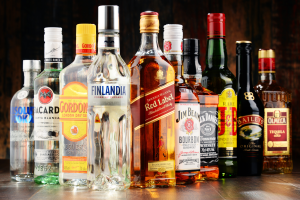
Can’t argue with this
I’ve written a few articles on anxiety and how to manage it. Today I will discuss how what we put into our bodies can directly affect the level of anxiety we feel. Caffeine, alcohol, tobacco and sugars can all be especially harmful and exacerbate anxiety for those of us who suffer from it.

Caffeine. We love our caffeine! Caffeine doesn’t love us, though. Research has shown that caffeine can cause people with a genetic predisposition to panic attacks are likely to have more panic attacks. People who are worry-warts, or who have generalized anxiety typically have tense muscles. This muscle tension will be greater with caffeine consumption. It also increases the physical sensations of folks with social anxiety such as flushing, sweating and shakiness. In general, anyone with anxiety will be likely to feel more anxiety due to caffeine intake. Caffeine can obviously interfere with sleep as well.
Slowly reduce your caffeine intake from coffee, sodas, teas, energy drinks, or significant amounts of chocolate. Caffeine will likely increase any amount of anxiety you have! If coffee is a necessity, try gradually switching to decaf.

Alcohol. Alcohol can cause a lot of problem for folks with anxiety or depression. A moderate amount of alcohol can quickly and temporarily induce a relaxed state. People sometimes drink more alcohol the more stressed they get, in larger quantities or with more frequency–or both. Even though it may help temporarily, it’s actually an anxiety-causing agent! Your liver has to process and detoxify 90% of alcohol, and when it leaves the body it leaves your nerves in an agitated state. It may get you to sleep easier, but you’ll more likely wake up halfway through the night, and be less likely to go back to sleep. Binge drinking is even worse, the anxiety or panicky effects hitting hours after your drinking, which many don’t connect with alcohol use.
There is a good alternative. Using (caffeine free) herbal teas in the evening are a better substitute, especially those with calming properties such as kava, chamomile, catnip, lemon balm, hops or valerian. Herbal teas don’t carry some of the harmful ingredients of teas that use the tea leaf, such as caffeine and tannic acid.
 Tobacco has a ton of harmful health effects, most of which I don’t have to tell you about it. You don’t want cancer or emphysema? Don’t use tobacco. Bear in mind also that while people often smoke if they need to relax, the temporary relaxation effect comes from feeding your body’s addiction, and engaging in a ritual. Tobacco itself is a stimulant, like caffeine. Often people who use tobacco have feelings of dizziness, tingling, shortness of breath, and guilt about using tobacco.
Tobacco has a ton of harmful health effects, most of which I don’t have to tell you about it. You don’t want cancer or emphysema? Don’t use tobacco. Bear in mind also that while people often smoke if they need to relax, the temporary relaxation effect comes from feeding your body’s addiction, and engaging in a ritual. Tobacco itself is a stimulant, like caffeine. Often people who use tobacco have feelings of dizziness, tingling, shortness of breath, and guilt about using tobacco.
I get it, there’s no easier way to produce anxiety than to tell a smoker they need to quit, so try just keeping track of your reactions and see if it is helping or hurting your anxiety in the long-term. If you have anxiety and feel the need to use tobacco, try using breathing from the diaphragm technique, or any of the others I mentioned in my previous article on managing anxiety.

Sugar has a pretty terrible effect on people who suffer from anxiety or depression. It’s not very good for anyone else, either. Sugar stimulates various sensations in the body. It can cause fatigue, trouble thinking, blurry vision, insomnia, irritability, excessive sweating at night and other feelings that can increase anxiety for folks who already are hypersensitive and hypervigilant to any changes in how their body feels.
Sugar is an inflammatory, and sugars tend to use up the vitamin B we need to maintain good moods. I’m not saying never eat sugar, I’m asking you to consider your intake. Try reducing it if you believe it is excessive, and see how it affects you over time. Some of us emotionally eat. if this describes you please check out the article I wrote on emotional eating.
For each of these suggestions, try keeping an anxiety diary or journal. Track when and how much you use any of the above substances, and how much anxiety you have during the day, using a simple 0 – 10 scale. Try comparing this with days when you reduce or eliminate your intake of alcohol, or caffeine, or tobacco, or days when you have significantly less sugar. Give yourself a month after you’ve made a change and see what changes. If things get better, try making another change.
This is not meant as a guide to completely eliminate all anxiety. Life means feeling anxiety sometimes, and that’s not a bad thing. While any of these substances can make anxiety worse, none of these substances flat-out cause anxiety out of nowhere. If you feel as though anxiety, panic or worry are negatively affecting your quality of life, you may also want to try a self-help book and/or a competent mental health professional like myself. Remember you only get the one life, how do you want to spend it? Don’t procrastinate, take action, you’ll thank yourself down the line!
This article was written by Jason Chastain, and independently licensed clinical social worker in the state of Washington.